Please fill out the following information, and RRFC Admissions will contact you to discuss our program offerings:
Issue #175
by L. Swift and Jeff McQ
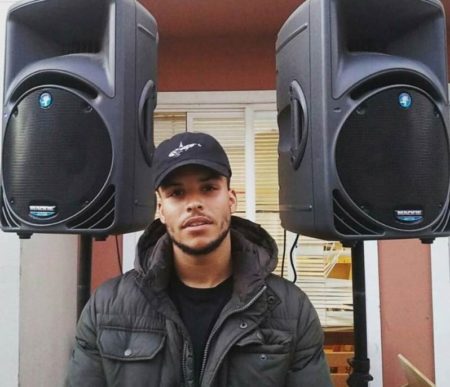 A few years ago, Tavior Mowry (San Francisco, CA) was on the road to pursue his dream of becoming a professional football player. Excelling in high school, he earned a full-ride scholarship to play at U.C. Davis.
But then something happened that forced him to rethink his plans.
“I ended up actually having a career-ending injury,” he says. “And from that point forward, they still paid for my schooling, but I wasn’t able to play sports anymore.”
Tavior had a lifelong interest in music, and he even began picking up instruments and producing some music on his own in college, but he hadn’t considered it as a career. He moved to the San Francisco Bay Area and took a job as a wine salesman. “I was very unhappy with that job,” he says, “because it was difficult for me to spend so much of my time doing something that I wasn’t passionate about.”
The turning point for Tavior came during a conversation with his mom. “I was telling her where my passions were as far as music, creating, engineering,” he says. And she was like, ‘You know what? Maybe you should go to school.’”
That very day, Tavior says, he started researching different schools for audio production, and soon discovered the Recording Connection and the opportunity to learn on-the-job. Within a week of calling the office, he had an initial interview with industry veteran Zack Phillips (The Kooks, Talib Kweli), who teaches Recording Connection students out of the famed Hyde Street Studios in San Francisco.
“When I walked in,” says Tavior, “I saw all the artists that had come into there and had recorded there and left their mark…There’s a lot of history there.”
A few years ago, Tavior Mowry (San Francisco, CA) was on the road to pursue his dream of becoming a professional football player. Excelling in high school, he earned a full-ride scholarship to play at U.C. Davis.
But then something happened that forced him to rethink his plans.
“I ended up actually having a career-ending injury,” he says. “And from that point forward, they still paid for my schooling, but I wasn’t able to play sports anymore.”
Tavior had a lifelong interest in music, and he even began picking up instruments and producing some music on his own in college, but he hadn’t considered it as a career. He moved to the San Francisco Bay Area and took a job as a wine salesman. “I was very unhappy with that job,” he says, “because it was difficult for me to spend so much of my time doing something that I wasn’t passionate about.”
The turning point for Tavior came during a conversation with his mom. “I was telling her where my passions were as far as music, creating, engineering,” he says. And she was like, ‘You know what? Maybe you should go to school.’”
That very day, Tavior says, he started researching different schools for audio production, and soon discovered the Recording Connection and the opportunity to learn on-the-job. Within a week of calling the office, he had an initial interview with industry veteran Zack Phillips (The Kooks, Talib Kweli), who teaches Recording Connection students out of the famed Hyde Street Studios in San Francisco.
“When I walked in,” says Tavior, “I saw all the artists that had come into there and had recorded there and left their mark…There’s a lot of history there.”
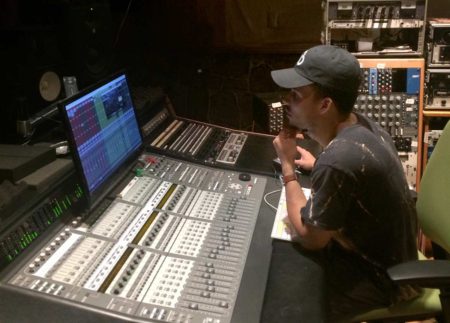 Tavior quickly understood the opportunity he had been given under Zack’s mentoring. “Zack is one of the best teachers I’ve ever had,” he says. “Just hearing from all the other engineers at Hyde Street Studios, he’s very highly regarded. Every time I tell somebody I was studying under him, they‘d be like, ‘Man, I wish I could do that.’ And these are like engineers who, you know, are established in their career, and they still look up to Zack. So I was very fortunate to have the opportunity to…just be like a sponge whenever he would speak about things, whether it be the music industry, the business, or engineering.”
Tavior says apprenticing with Zack has helped him up his own game as well. “When I would hear records play on the radio,” he says, “or producers and artists that I admired, my beats didn’t sound like theirs. And I was trying to understand like, ‘Well, how did they make their kick so loud? Like why are their 808s blaring? Why are their snares so sharp? And then that’s what led me to, ‘Oh, it’s being mixed properly.’ And not only is it being mixed properly, but it’s being mixed in a proper acoustically-treated environment. And that’s where my eyes started to open when it came to engineering and the importance of mixing.”
In addition to his one-on-one training, Tavior says Zack also arranged for him to spend more time at Hyde Street Studios in an intern role. “I was able to meet all different engineers and artists that would come in and out of the studio,” says Tavior. “I would also have the opportunity to sit in on sessions, sit in on tracking sessions, and even set up for tracking sessions.”
With his newfound skills, Tavior looks forward to working on more projects with up-and-coming artists as a producer and engineer, as well as continuing to develop as an artist himself. But the lessons he learned in football are coming into play as well, as he purposes not to limit his options.
“Something that I’ve taken off the field into the studio is that if you can play all the positions, you won’t find yourself on the bench,” he says. “That is kind of a motto that I live by…I feel that the more diverse you are, the more opportunities there are for you.”
Follow Tavior Mowry on Instagram
Tavior quickly understood the opportunity he had been given under Zack’s mentoring. “Zack is one of the best teachers I’ve ever had,” he says. “Just hearing from all the other engineers at Hyde Street Studios, he’s very highly regarded. Every time I tell somebody I was studying under him, they‘d be like, ‘Man, I wish I could do that.’ And these are like engineers who, you know, are established in their career, and they still look up to Zack. So I was very fortunate to have the opportunity to…just be like a sponge whenever he would speak about things, whether it be the music industry, the business, or engineering.”
Tavior says apprenticing with Zack has helped him up his own game as well. “When I would hear records play on the radio,” he says, “or producers and artists that I admired, my beats didn’t sound like theirs. And I was trying to understand like, ‘Well, how did they make their kick so loud? Like why are their 808s blaring? Why are their snares so sharp? And then that’s what led me to, ‘Oh, it’s being mixed properly.’ And not only is it being mixed properly, but it’s being mixed in a proper acoustically-treated environment. And that’s where my eyes started to open when it came to engineering and the importance of mixing.”
In addition to his one-on-one training, Tavior says Zack also arranged for him to spend more time at Hyde Street Studios in an intern role. “I was able to meet all different engineers and artists that would come in and out of the studio,” says Tavior. “I would also have the opportunity to sit in on sessions, sit in on tracking sessions, and even set up for tracking sessions.”
With his newfound skills, Tavior looks forward to working on more projects with up-and-coming artists as a producer and engineer, as well as continuing to develop as an artist himself. But the lessons he learned in football are coming into play as well, as he purposes not to limit his options.
“Something that I’ve taken off the field into the studio is that if you can play all the positions, you won’t find yourself on the bench,” he says. “That is kind of a motto that I live by…I feel that the more diverse you are, the more opportunities there are for you.”
Follow Tavior Mowry on Instagram
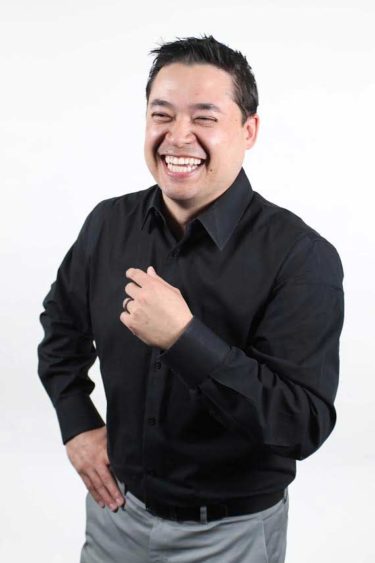 ON THE TYPES OF PROJECTS THAT COME INTO HIS PRODUCTION STUDIO:
“[We do] commercials, marketing videos, we’ve done some documentary work, training videos, safety videos, a lot of internal corporate video work…we don’t shy away from any industry…Then, just in the past year, we’ve ventured into original content. We have a Creative Director on our staff that has thousands and thousands of hours in producing television commercials, more reality based stuff for some of these networks like HGTV and Travel Channel and stuff like that. So we’re…we’re getting ready to do a couple shows that are going to be on television. And we’re actually in talks right now, we’ve got two scripts for feature length films that are looking to have us help out with production and post later this fall. And that’s due to a lot of the tax incentive increase here in Kentucky. There are a lot of films coming here this time now, which is really helping us as well.”
HIS THOUGHTS ON THE CHANGING LANDSCAPE OF THE FILM INDUSTRY:
“Because traditional media, which was shoot to tape, get it cut, and then get it back onto a tape and sent out to broadcast stations, well, all of that doesn’t happen anymore. It’s all digital now. So when stuff gets done, we shoot it all on a card now and bring it in digitally already, and are able to start editing this thing the same day, if possible. You get that done, you basically create a file digitally and email it to wherever you want it to go. From concept to delivery, it’s a lot shorter now. So the biggest thing is the compression rates because they’re always trying to make the file sizes smaller but keep the highest quality possible. So those are the things that we pay attention to the most, especially now that we’re getting into a lot more broadcast television series, original content, OTT stuff that goes on people’s YouTube channels and Facebook pages and stuff like that…
“I’ll tell you one thing that I’ve noticed…We’ve got really nice edit suites here in the office and we take pride in making sure that they’re sound-proof, they’ve got a big screen inside of them, they’ve got great sound in there when the client comes in and is doing an edit process and watching the edit unfold. But within the last, I would say, three or four years, clients are not coming in the office anymore. They are translating everything through email or they jump on a Skype call and they just want the link. They want the Vimeo or the YouTube or just the file to look at and then review from there. So it has become harder and harder to get the clients into the office. They come here and look at our facility, which is brand new, and they love it, but they still have a lot of work to do and they’re relying on us to do a lot of the work for them.”
ON THE TYPES OF PROJECTS THAT COME INTO HIS PRODUCTION STUDIO:
“[We do] commercials, marketing videos, we’ve done some documentary work, training videos, safety videos, a lot of internal corporate video work…we don’t shy away from any industry…Then, just in the past year, we’ve ventured into original content. We have a Creative Director on our staff that has thousands and thousands of hours in producing television commercials, more reality based stuff for some of these networks like HGTV and Travel Channel and stuff like that. So we’re…we’re getting ready to do a couple shows that are going to be on television. And we’re actually in talks right now, we’ve got two scripts for feature length films that are looking to have us help out with production and post later this fall. And that’s due to a lot of the tax incentive increase here in Kentucky. There are a lot of films coming here this time now, which is really helping us as well.”
HIS THOUGHTS ON THE CHANGING LANDSCAPE OF THE FILM INDUSTRY:
“Because traditional media, which was shoot to tape, get it cut, and then get it back onto a tape and sent out to broadcast stations, well, all of that doesn’t happen anymore. It’s all digital now. So when stuff gets done, we shoot it all on a card now and bring it in digitally already, and are able to start editing this thing the same day, if possible. You get that done, you basically create a file digitally and email it to wherever you want it to go. From concept to delivery, it’s a lot shorter now. So the biggest thing is the compression rates because they’re always trying to make the file sizes smaller but keep the highest quality possible. So those are the things that we pay attention to the most, especially now that we’re getting into a lot more broadcast television series, original content, OTT stuff that goes on people’s YouTube channels and Facebook pages and stuff like that…
“I’ll tell you one thing that I’ve noticed…We’ve got really nice edit suites here in the office and we take pride in making sure that they’re sound-proof, they’ve got a big screen inside of them, they’ve got great sound in there when the client comes in and is doing an edit process and watching the edit unfold. But within the last, I would say, three or four years, clients are not coming in the office anymore. They are translating everything through email or they jump on a Skype call and they just want the link. They want the Vimeo or the YouTube or just the file to look at and then review from there. So it has become harder and harder to get the clients into the office. They come here and look at our facility, which is brand new, and they love it, but they still have a lot of work to do and they’re relying on us to do a lot of the work for them.”
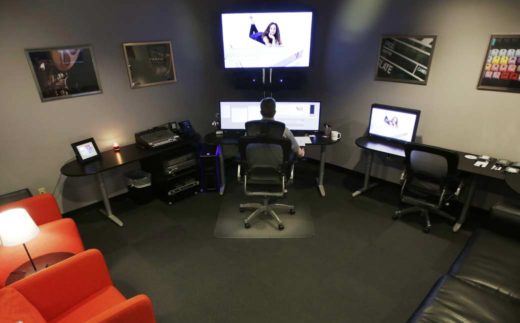 ON THE GROWING ROLE OF SOCIAL MEDIA IN THE FILM/VIDEO MARKET:
“Facebook has obviously become not just a social media platform but an advertising platform. A lot of people aren’t understanding that or wanting to believe that, but they are basically a broadcast channel now, and the data that you can show a client that shows how many people can watch a video on there…It’s imperative for a company that is trying to advertise or push a product or campaign to do some kind of Facebook advertising and to be involved in Facebook to get people to come to your page and see what you’re all about. And there are other ones like Instagram and Twitter obviously…But YouTube and Facebook are the biggest social media advertising platforms for companies. For films and television…I think for independent film, it’s a platform. For any type of video, any type of production, it is essential if you’re trying to get the word out there or get a following, get attention. Because the only way in this day in age that we’re living in, 2017 right now, it’s not necessarily about putting an ad out on Facebook and geo-targeting and hoping people watch it. It’s getting them to enjoy it enough to hit Share, to hit Post on their timeline so that they’re starting conversations and they get the people that follow them to see it and so forth…If you don’t have something that grabs a person’s attention in the first five seconds, they’ll skip right over it.”
ON WHY HE WAS DRAWN TO THE FILM CONNECTION’S MENTORSHIP APPROACH, AND THE IMPORTANCE OF LEARNING ON THE JOB:
“It is a little difficult sometimes to get people out of college that are looking to work with us or help work with us. Sometimes they’re not trained properly in what we need them to do…they’re not getting enough hands-on training, and we tend to be having to train them up or having to just pass on them and get somebody else out of market possibly. So that’s been a little bit of a struggle. So [Film Connection] was a little better for me because I felt like we can then train people how we do things, and how we feel like the industry around the country does things, the type of systems we have, the type of cameras we use that are used around the world. So it appealed to me better to be able to get hold of somebody early on and train them… We get them involved, and they’re asking questions and they’re learning as they go, which is a lot better system for us versus the kind of traditional internship…I remember when I was young coming through here, I would have loved to have something like this.”
ADVICE ON HOW APPRENTICES CAN DIFFERENTIATE THEMSELVES AND INCREASE THEIR CHANCES OF BEING HIRED:
“The biggest thing is to not pigeonhole yourself into one job type. If you can, learn as much as you can about the entire process, because if it’s a film or a marketing video, it’s all done the same way. There’s a creative process, there’s a preproduction process, there’s a writing or location scouting process, there’s a shooting process, there’s a post process, there’s an approval process, and there’s a delivery process. So it’s the same, be it a movie, TV show, or marketing film or be it a documentary or commercial. But the way I feel I’ve thrived, and a lot of people in this building have, is that I know every aspect. I’ve been a shooter before, I’ve been an editor before, I’ve worked on creative before, I’ve produced before. I think the more you learn and the more you know, and the more skills you can develop, the more often you’ll have the job opportunities…If you can get your skills up and maybe write this, maybe edit this, maybe shoot this, maybe produce this, you’re going to be constantly working.”
ON THE GROWING ROLE OF SOCIAL MEDIA IN THE FILM/VIDEO MARKET:
“Facebook has obviously become not just a social media platform but an advertising platform. A lot of people aren’t understanding that or wanting to believe that, but they are basically a broadcast channel now, and the data that you can show a client that shows how many people can watch a video on there…It’s imperative for a company that is trying to advertise or push a product or campaign to do some kind of Facebook advertising and to be involved in Facebook to get people to come to your page and see what you’re all about. And there are other ones like Instagram and Twitter obviously…But YouTube and Facebook are the biggest social media advertising platforms for companies. For films and television…I think for independent film, it’s a platform. For any type of video, any type of production, it is essential if you’re trying to get the word out there or get a following, get attention. Because the only way in this day in age that we’re living in, 2017 right now, it’s not necessarily about putting an ad out on Facebook and geo-targeting and hoping people watch it. It’s getting them to enjoy it enough to hit Share, to hit Post on their timeline so that they’re starting conversations and they get the people that follow them to see it and so forth…If you don’t have something that grabs a person’s attention in the first five seconds, they’ll skip right over it.”
ON WHY HE WAS DRAWN TO THE FILM CONNECTION’S MENTORSHIP APPROACH, AND THE IMPORTANCE OF LEARNING ON THE JOB:
“It is a little difficult sometimes to get people out of college that are looking to work with us or help work with us. Sometimes they’re not trained properly in what we need them to do…they’re not getting enough hands-on training, and we tend to be having to train them up or having to just pass on them and get somebody else out of market possibly. So that’s been a little bit of a struggle. So [Film Connection] was a little better for me because I felt like we can then train people how we do things, and how we feel like the industry around the country does things, the type of systems we have, the type of cameras we use that are used around the world. So it appealed to me better to be able to get hold of somebody early on and train them… We get them involved, and they’re asking questions and they’re learning as they go, which is a lot better system for us versus the kind of traditional internship…I remember when I was young coming through here, I would have loved to have something like this.”
ADVICE ON HOW APPRENTICES CAN DIFFERENTIATE THEMSELVES AND INCREASE THEIR CHANCES OF BEING HIRED:
“The biggest thing is to not pigeonhole yourself into one job type. If you can, learn as much as you can about the entire process, because if it’s a film or a marketing video, it’s all done the same way. There’s a creative process, there’s a preproduction process, there’s a writing or location scouting process, there’s a shooting process, there’s a post process, there’s an approval process, and there’s a delivery process. So it’s the same, be it a movie, TV show, or marketing film or be it a documentary or commercial. But the way I feel I’ve thrived, and a lot of people in this building have, is that I know every aspect. I’ve been a shooter before, I’ve been an editor before, I’ve worked on creative before, I’ve produced before. I think the more you learn and the more you know, and the more skills you can develop, the more often you’ll have the job opportunities…If you can get your skills up and maybe write this, maybe edit this, maybe shoot this, maybe produce this, you’re going to be constantly working.”
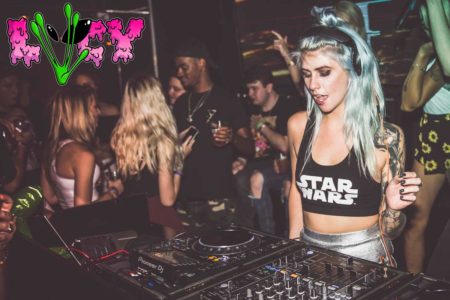 Recording Connection student Emily Stamer aka LUCY (Orlando, FL): “Strike now or someone else will.” Wise words from my mentor as I sat and watched my friend perform. She’s killing it but seeing someone succeed is making me want it more. All I want to do is get better and learn more. When I go out to shows, it’s not the same anymore. All I think about is what I should be doing, networking is always a plus but my music is my number #1. I want this more than anything. Tonight I am playing on a party bus to EPROM one of my biggest inspirations. Then on Wednesday, [I] play at one of the biggest clubs in Orlando Tier opening for Pull Over. Will probably be my biggest set of people yet! Very excited.”
Recording Connection student Emily Stamer aka LUCY (Orlando, FL): “Strike now or someone else will.” Wise words from my mentor as I sat and watched my friend perform. She’s killing it but seeing someone succeed is making me want it more. All I want to do is get better and learn more. When I go out to shows, it’s not the same anymore. All I think about is what I should be doing, networking is always a plus but my music is my number #1. I want this more than anything. Tonight I am playing on a party bus to EPROM one of my biggest inspirations. Then on Wednesday, [I] play at one of the biggest clubs in Orlando Tier opening for Pull Over. Will probably be my biggest set of people yet! Very excited.”
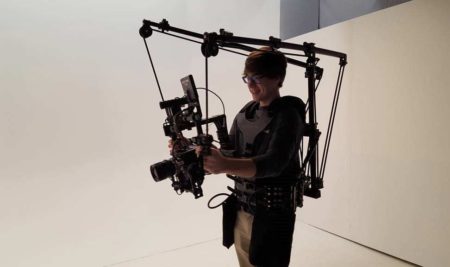 Film Connection student Jason Reinhardt (Atlanta, GA) is excited about his future but feeling a little bittersweet about his studies coming to an end: “I’m sad to say we completed the last chapter of the book today. The course is coming to an end, but not my career. After everything, I feel far more comfortable and ready to enter the film industry. I was given the opportunity to work with Steve Carmichael, my mentor, as Camera Assistant and P.A. for multiple shoots on a documentary…Steve helped me in my search to buy a camera, and let me borrow some of his own personal equipment to use until I was able to get it myself. Now, near the end of the course, he’s introducing me to clients, crew and employees of Rite Media Group, where he has his office. Learning and working with Steve has been a phenomenal experience and one of a kind. Thanks Film Connection.”
Film Connection student Jason Reinhardt (Atlanta, GA) is excited about his future but feeling a little bittersweet about his studies coming to an end: “I’m sad to say we completed the last chapter of the book today. The course is coming to an end, but not my career. After everything, I feel far more comfortable and ready to enter the film industry. I was given the opportunity to work with Steve Carmichael, my mentor, as Camera Assistant and P.A. for multiple shoots on a documentary…Steve helped me in my search to buy a camera, and let me borrow some of his own personal equipment to use until I was able to get it myself. Now, near the end of the course, he’s introducing me to clients, crew and employees of Rite Media Group, where he has his office. Learning and working with Steve has been a phenomenal experience and one of a kind. Thanks Film Connection.”

RRFC is education upgraded for the 21st century.
Get the latest career advice, insider production tips, and more!
Please fill out the following information, and RRFC Admissions will contact you to discuss our program offerings:
Stay in the Loop: Subscribe for RRFC news & updates!
© 2025 Recording Radio Film Connection & CASA Schools. All Rights Reserved.


